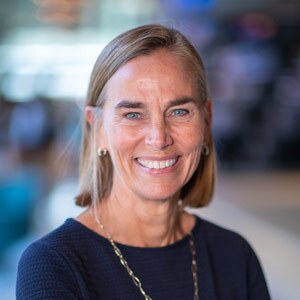MANCHESTER — With her retirement a few months away, Leeny Oberg, Marriott International’s chief financial officer and executive vice president of development, spoke at an industry conference, reflecting on her almost 40-year journey in the hotel and hospitality industry, including nearly 30 years at the world’s largest hotel firm.
At a keynote session at the Annual Hotel Conference titled “Global forces, local focus: A CFO’s perspective on growth, mergers and acquisitions and market momentum,” Oberg said much has changed during those four decades, including Marriott’s share price.
“It was $5 then, Now, it is $260, and we have more than 9,300 hotels and 1.7 million rooms,” she said.
She said that success derives from good management and hotel quality but also due to the economic power of travel.
“The hotel industry is growing at a faster rate than [gross domestic product], which is all about the growing ease of travel and the desire to travel, with more people entering the middle class. The dynamics are really good,” she said. “Everything is not the same all over the world, but a hotel must fit the market and the owner’s aspirations. That’s where the purse strings are, and it is my job to do that in a disciplined way."

In Europe, Marriott has huge room for growth, Oberg said.
“Marriott has 4% market share across Europe against the 16% we have in the U.S. Our Four Points Flex by Sheraton brand [including pipeline] is now in 40 cities in six European markets. Our desire is to be in all places for all people and at all price points,” she said.
Operating hotels for that brand include 14 in Denmark and seven in the United Kingdom, its two largest individual markets.
In Denmark, Four Points Flex has hotels in tertiary markets such as Hillerød, Horsens, Ishøj and Vejle.
“We want to be across all segments. One focus is on conversions in tertiary markets where members can still gain points. Being local helps us be global.
“And luxury is only 10% of our room portfolio and 10% of our pipeline. Two upcoming examples will be a new W in Manchester and a new St. Regis in London,” she said.
Oberg said that when she started, conversions were only in the U.S.
“Internationally, there was hardly any,” she said.
There are many things that have changed for the industry across the planet that cannot be controlled from Marriott’s headquarters in Bethesda, Maryland, she said.
“All business is dealing with even more confused geopolitics, and what that means for global travelers. We pay attention to that, but we have no concerns that our hotels cannot deliver experiences. We’ve grown signings 10% a year over the last decade,” she added.
One European market that keeps on a winning streak is the U.K.
“The entire notion of global travel makes the U.K. very important,” she said.
Her interviewer, hotel consultant David Bailey, hinted that Moxy was developed as an answer to the immediate success of CitizenM, a brand Marriott acquired earlier this year.
Oberg replied that most major hotel firms have a strategy of acquiring brands at the same time as developing in-house ones, with the combination fueling overall growth and shareholder returns.
“Growing a brand brings in excellent returns, but it takes longer to ramp up. Take as an example, AC Hotels out of Western Europe. It had 80 hotels when we bought it 14 years ago. Now, including pipeline, it has more than 400. We took what we saw as a unique brand but saw that it was one that could be taken internationally,” she said.
She said CitizenM inhabited a similar space to Moxy, a brand developed in-house, but it had a different aesthetic.
“Again, [CitizenM] … can be grown internationally, but if we had developed it from nothing, it would have taken too long. It is a brand we view as opportunistic and valuable. Overall, of the rooms we have added, apart from the Starwood Hotels acquisition, only 7% to 8% came from acquisitions,” she said.
New horizons
Oberg said she would find leaving Marriott incredibly hard.
“The acquisition of Starwood, COVID-19, the passing of a beloved CEO [Arne Sorenson]. I have worked in London for Marriott for two years, the cyberattack. The best advice I have been given is to be curious and understand what it is that is important for businesspeople. Both help you from the standpoint of innovation and to realize where the market is going. And it makes work fun,” she said.
“It is tough out there, but the industry has fantastic long-term dynamics and some super people. The industry is very powerful in what it can do in making the world smaller, making connections with one another.”
Industry culture has to be about people and connections, Oberg said.
“I have worked on Wall Street, which also is high pressure and long hours, but it is not about people,” she said.
Bailey said it had to be a compliment that her replacement at Marriott actually will be two people, Jen Mason as CFO and Shawn Hill as chief development officer.
One other thing changed in her long tenure at Marriott.
“For the first decade and a half, we could not earn Bonvoy (loyalty-program) points," she said. “Then it dawned on us that Marriott employees would be among our very best ambassadors."
When the time officially comes for her to step away, Oberg said she's going to take advantage of her built-up loyalty points.
"In my retirement, I look forward to using some of those points in travel to Asia,” she said.





